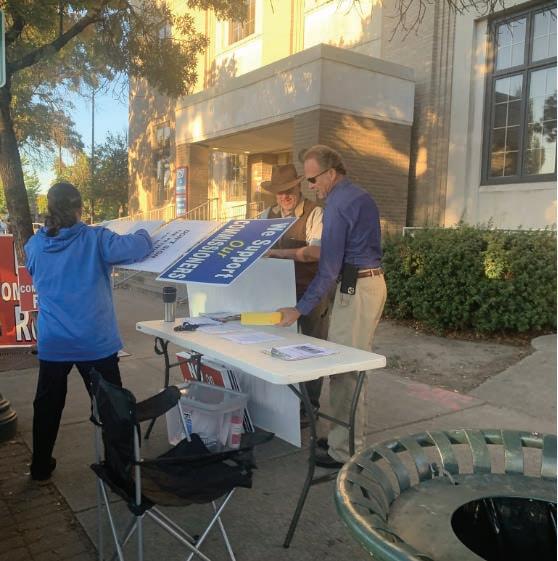
WEDNESDAY, SEPTEMBER 24, 2025


WEDNESDAY, SEPTEMBER 24, 2025
By Ellen Ward
The political climate in Oregon this week is defined by tension on multiple fronts, as state leaders grapple with lawsuits from Washington, shifting dynamics within the Legislature, and the growing uncertainty of federal benefit programs that thousands of Oregonians depend on. Taken together, the developments underscore how fragile the balance between state governance and national power has become, while also exposing the pressures of partisan politics at home.
At the center of the storm is a lawsuit filed by the U.S. Department of Justice against Oregon and Maine over voter registration lists. The federal government is demanding electronic copies of the state’s voter rolls, including details on ineligible registrants, in the name of enforcing federal election laws. Oregon officials have resisted, arguing that such a release could jeopardize privacy and raise constitutional questions about the limits of federal oversight. The clash pits Oregon’s long history of vote-by-mail and expansive registration access against federal demands for trans-

parency in how voter data is handled. The case could become a test of whether states have the final say over how they safeguard their elections or whether federal authority ultimately overrides those concerns.
The implications are enormous. If Oregon loses, it could be required to share detailed data about voters on a scale it has never allowed, reshaping election oversight and potentially exposing sensitive information. If Oregon prevails, it
would send a message that states retain broad discretion over how they manage their electoral systems, even in the face of federal directives.
Either way, the outcome will ripple far beyond the Pacific Northwest, adding fuel to the already fierce national debate about election integrity and voter rights.
Even as that legal battle unfolds, Oregon is bracing for another blow from Washington, D.C.
The Environmental Protection Agency under
the current administration has announced its intention to revoke a scientific finding made in 2009 that linked greenhouse gases to harm in public health and the environment. That finding, known as the “endangerment finding,” has been the foundation for regulating emissions from vehicles and other sources. Oregon environmental officials warn that rolling it back could cripple the state’s ability to meet its climate goals, particularly in transportation, which is one of the largest contributors to greenhouse gases in the state.
For a state that has positioned itself as a leader in renewable energy and climate action, the timing is grim. Oregon’s Department of Environmental Quality has invested years into programs designed to reduce emissions, and Governor Tina Kotek has championed ambitious carbon reduction targets. Without federal backing, those programs face legal and logistical obstacles, potentially forcing the state to either water down its goals or seek costly workarounds. The debate illustrates the uneasy balance be-
By John Oliver
In the wake of Charlie Kirk’s assassination, one of the most disturbing trends to emerge has not been the national mourning, but the calculated opportunism that has followed. Political committees and public figures who have chosen to capitalize on his death as a marketing tool should be ashamed. What we are witnessing is a textbook example of exploitation of tragedy, where grief and shock are hijacked not for remembrance or reflection, but for self-enrichment and political gain.
In Josephine County, and across Oregon, this pattern has become glaringly clear in recent weeks. Opportunists have latched onto Kirk’s death not as a moment of solemn unity, but as a fresh resource to exploit. Instead of allowing space for respect and contemplation, they have turned grief into political capital, using a man’s violent end as fodder to rally support for causes, campaigns, and committees that have little to do with honoring the life lost. The practice is both opportunism and grief exploitation, and it corrodes public trust while deepening cynicism about political motives.
The outrage should not be limited to Josephine County. This manipulation should sicken residents across Oregon and the nation. To exploit death in this way is not only dishonorable but corrosive to the very principles of democracy. It reduces civic engagement to emotional manipulation and strips individuals of the ability to make choices based on facts and policies. The death of Charlie Kirk is not a campaign slogan, yet that is precisely how it is being twisted.
What makes this trend particularly insidious is the lack of originality or authenticity behind it. The individuals and organizations that practice it have nothing of substance to offer, so they borrow the weight of tragedy to mask their hollowness. Rather

than presenting ideas or policies on their own merit, they seize upon another’s misfortune and drape it over their own agendas. The message becomes less about honoring the dead and more about advancing the living—those who profit politically, financially, or personally from the spectacle of grief.
The most galling aspect locally is how this exploitation has been woven into the rhetoric surrounding Josephine County politics. Residents here have watched opportunists fold Kirk’s death into campaigns that are designed not to serve the public interest, but to preserve the shaky reputations of embattled leaders. Anti-recall efforts targeting two sitting county commissioners have leaned on this tragedy as if it were a campaign strategy, dragging the memory of a murdered man into a fight over transparency and accountability. This is not just shameless; it is deeply disrespectful to the community that deserves honesty, not manipulation.
Transparency, the very thing our commissioners struggle to demonstrate, cannot be achieved by wrapping themselves in the shroud of someone else’s death. Public office is supposed to serve the community, not to find the nearest tragedy and weaponize it as a shield. Residents should be wary of those who stoop to this level, because such actions speak volumes about character and leadership. If a politician cannot stand on their own record or defend their policies with facts, but instead must reach into the grave for leverage, then they have forfeited any claim to integrity.
It is worth naming what this practice is: exploitation of tragedy, griefwashing, opportunism. Call it whatever you like, the result is the same. Death is turned into a commodity. Pain is transformed into a talking point. Grief is packaged and sold as if it were campaign literature. It is sickening. It is disturbing. And it has no rightful place in Josephine County—or anywhere else in this nation.
The public deserves better. Voters deserve leaders who can stand before them with transparency, with ideas, and with courage, not with the borrowed sorrow of someone else’s death. Communities deserve to remember the fallen without the taint of political self-interest. And most of all, the family and friends of Charlie Kirk deserve to mourn in peace, without his name becoming another pawn in the ugly game of political maneuvering.
Opportunism thrives in darkness, in the spaces where emotion overwhelms reason. The antidote is awareness. The residents of Josephine County, and communities across Oregon, must remain vigilant. They must recognize the difference between genuine leadership and cynical exploitation. They must watch closely for those who reach for tragedy when their own credibility fails. And when they see it, they must reject it outright.
Exploiting death for political gain is not politics as usual. It is not strategy. It is parasitism. And when it becomes normalized, it erodes the very foundation of trust between people and their government. Josephine County, Oregon, and the nation at large cannot afford to let this sickness spread unchecked. It is time to call out opportunists for what they are and to demand better from those who claim to lead.


PRESENTS ITS 12TH ANNUAL RELENTLESS DEVASTATIONAL GOLF TOURNAMENT @ Grants Pass Golf Club September 20th | Tee Time @ 9:00 AM
2-man scramble
18 holes with cart
$250 per Team Lunch, Driving Range, & Contest Entries Included
For early registration or Sponsorship Information contact Eric Hennings 541-659-6136 Or Chris Hennings 541-601-0750 www.relentlessheroes.org
Raffle, Silent Auction, Prizes & Games ALL PROCEEDS GO TO LOCAL VETS


By Ellen Ward
Poppi, a Texas-based beverage company that rose to prominence by marketing its sparkling prebiotic sodas as a gut-healthy alternative to traditional soft drinks, has become the subject of a high-profile national class action lawsuit that could reshape how functional beverages are advertised in the United States. The litigation, filed in California in May 2024, accused the company of misleading consumers with claims that its drinks provided meaningful digestive health benefits. Although Poppi denies wrongdoing, the company has agreed to an $8.9 million settlement, which is now awaiting final court approval.
The lawsuit was brought by a California consumer, who argued that Poppi’s marketing overemphasized digestive health benefits that could not reasonably be achieved by consuming its products as instructed. At the center of the complaint is Poppi’s use of prebiotic fiber derived from agave inulin. Each can of Poppi contains roughly two grams of this fiber, which plaintiffs claim is far below the amount needed to provide meaningful effects on gut microbiota or digestion. According to the filing, marketing materials that positioned Poppi as a “gut-healthy” choice left consumers with the impression that a single serving could make a significant impact, when in reality, meaningful results would require a far higher daily intake. Critics also highlighted that drinking enough cans to approach a beneficial level of prebiotics would simultaneously increase sugar intake, which could undermine the very health claims being promoted. By creating this apparent contradiction, the lawsuit alleged that

the company engaged in false and misleading advertising, violating consumer protection and false advertising statutes in California.
For its part, Poppi has consistently rejected the allegations. Company representatives maintain that the sodas are positioned as a healthier alternative to mainstream soft drinks, pointing to their lower sugar content, use of natural sweeteners, and inclusion of prebiotic fiber. Poppi has emphasized that its settlement is not an admission of liability but a practical resolution intended to avoid protracted legal costs and uncertainty.
The terms of the settlement cover a broad swath of consumers. Anyone in the United States who purchased any flavor or package size of Poppi between January 23, 2020, and July 18, 2025, is eligible to submit a claim. Depending on proof of purchase, consumers

may recover varying amounts. Those with receipts or other documentation can claim reimbursement based on the size and quantity of packages purchased, while those without proof are eligible for a capped amount per household. The structure ensures that even occasional purchasers may be entitled to some compensation, with minimum payments guaranteed.
The deadline for filing claims has been set for September 26, 2025. A fairness hearing is scheduled for November 20, 2025, at which a judge will determine whether the settlement adequately serves the interests of the affected class. If approved, payouts would likely be distributed in 2026.
The lawsuit against Poppi reflects a broader tension in the fast-growing functional beverage industry. In recent years, consumer demand
for drinks that promise more than hydration has soared, with companies touting everything from probiotics and prebiotics to adaptogens and antioxidants. Yet, as popularity has surged, so has scrutiny. Regulatory agencies, health professionals, and now the courts are increasingly challenging whether the claims made on labels match the scientific evidence supporting them.
For consumers, the Poppi case raises questions about what can reasonably be expected from products that occupy the gray space between traditional sodas and dietary supplements. While the inclusion of prebiotic fiber is not disputed, the matter of dosage and meaningful health outcomes remains unsettled. The settlement does not answer the underlying scientific question but does highlight how easily marketing language can shape perceptions about health benefits.
If finalized, the Poppi settlement may serve as a cautionary tale to other beverage companies eager to promote functional claims without substantial clinical backing. It may also prompt more stringent oversight from regulators and greater diligence from consumers navigating store shelves filled with promises of better health in a can.
At a time when Americans are more health-conscious than ever, the case illustrates the delicate balance between innovation, marketing, and accountability in the beverage sector. Poppi’s popularity is unlikely to vanish overnight, but the company’s legal journey underscores the growing demand for transparency and evidence in claims that touch directly on public health.














Advertise with The Grants Pass Tribune!
Stand with us in defending freedom of the press and the 1st Amendment! The Grants Pass Tribune is facing political persecution, with lawsuits aimed at silencing our bold investigative journalism. We remain committed to uncovering the truth and keeping our community informed like never before.
Show
By John Oliver
For the first time since the start of Russia’s full-scale invasion of Ukraine, NATO members have invoked Article 4 of the alliance treaty following reports that Russian drones crossed into Polish airspace. The move underscores rising tensions on Europe’s eastern flank and signals a new round of collective consultations over the security of member states bordering the war zone.
Polish officials reported that nineteen drones entered their territory in recent days. Prime Minister Donald Tusk stated that three or four of the drones posed an immediate threat and were shot down by Polish forces. The remainder reportedly fell from the sky as a result of technical failures or other issues before they could be engaged.

The incident represents one of the most serious violations of NATO airspace since hostilities between Russia and Ukraine escalated in February 2022. While several previous episodes involving missile fragments and wayward drones had caused alarm, this marks the first time that allies collectively decided to trigger Article 4. That clause provides for urgent consultations whenever a member believes its territorial integrity, political independence, or security is under threat.
From page 1
tween state ambition and federal authority in climate policy—a tension that will likely grow sharper in the months ahead.
On the home front, Oregon’s Legislature is showing signs of strain under the weight of partisan rigidity. Democrats hold supermajorities in both chambers, but unity is not guaranteed. One Democratic lawmaker, after breaking ranks on a major transportation bill, said she felt bullied by her own colleagues and chose not to run for reelection. Across the aisle, a Republican who dared to support aspects of that same bill was branded a traitor and eventually abandoned the party altogether. The message is clear: stepping out of line in Salem carries a steep cost.
Analysts note that the state’s political map has “hardened,” with fewer competitive seats and limited opportunities for shifts in legislative control. That makes incumbents safer but also risks reducing responsiveness to constituents who feel increasingly alienated from the process. Oregon voters are left with fewer chances to upset the balance of power, meaning internal divisions within the dominant party may shape policy as much as partisan rivalries ever did.
Meanwhile, outside of the Capitol, the very machinery of government faces its own challenges. Oregon’s eligibility workers—the people tasked with administering safety net programs like food
assistance and medical aid—are bracing for cuts as federal benefit programs face reductions. The fear is that as Washington pulls back, state workers will be left to handle a rising tide of need with shrinking resources. For families already living on the edge, the result could be slower processing times, delayed benefits, or outright denials of critical support.
Taken together, these developments paint a picture of a state caught between pressures from above and fractures within. Federal lawsuits, environmental rollbacks, and looming cuts to social programs highlight Oregon’s vulnerability to decisions made in Washington, while partisan rigidity in Salem exposes the limits of its own political flexibility.
Oregon has long prided itself on pioneering policies—from vote-by-mail elections to ambitious climate goals— but this week shows that even the most forward-looking state cannot govern in isolation. What happens in Washington increasingly dictates what is possible in Oregon, while what happens in Salem reveals how fragile political alliances can be, even among those who claim the same banner. For Oregonians, the question is not just whether their state will weather these storms, but whether it can still chart an independent course in an era of federal pushback and partisan hardening.
Poland, which shares a lengthy border with Ukraine, has been a central hub for Western military support since the outbreak of the conflict. Arms shipments, humanitarian aid, and refugee flows have made the country a frontline state in the wider European response. The latest drone incursions have amplified fears in Warsaw that Russian operations, whether accidental or deliberate, could spill further into NATO territory.
NATO officials stressed that consultations under Article 4 do not automatically imply a military response. Instead, they represent a forum for allied governments to exchange assessments and determine whether further defensive measures are required. In the past, Article 4 has been invoked during crises on NATO’s southern and eastern borders, often
leading to stepped-up patrols, missile defenses, or enhanced surveillance.
Military analysts note that the breach of Polish airspace highlights both the hazards of Russia’s drone campaign against Ukraine and the risks of escalation inherent in warfare fought so close to NATO’s frontiers. Many of the drones Russia employs are Iranian-designed Shahed models, which are inexpensive but imprecise. Their limited guidance systems can cause them to stray off course, raising the possibility of unintended border crossings.
The Polish government has maintained that it will continue to defend its skies vigorously. Earlier this year, Warsaw invested heavily in new air defense systems and has been coordinating closely with NATO’s integrated air and missile defense network. The downing of several drones in the latest incident demonstrates that these systems are operational and responsive.
For NATO, the episode comes at a moment when allied unity remains critical. The alliance has repeatedly affirmed its commitment to defend every inch of member territory. By invoking Article 4, Poland has ensured that its security concerns will be addressed collectively, keeping the issue at the forefront of alliance discussions.
Whether this latest breach reflects deliberate testing of NATO’s defenses or a byproduct of Russia’s ongoing drone war in Ukraine remains uncertain. What is clear is that the incident has once again reinforced the delicate balance between deterrence and escalation that NATO must navigate as the conflict grinds on.






Tired of doing everything "right" and still feeling exhausted, bloated, and stuck?
At Elysian Women's Wellness, we specialize in helping women 35–55 balance their hormones, heal their metabolism, and lose stubborn weight without crash diets or two-hour workouts.
We use our Metabolic Optimization Method to help you feel like you again.
• Functional & traditional lab work
• Sustainable weight loss
• Hormone-friendly exercise & nutrition
• Expert support & accountability

By Ellen Ward
Artificial intelligence has entered the classroom in ways that were once the realm of science fiction. For generations, traditional education has relied on a fixed formula: teachers presenting material in lectures, students taking notes, and learning measured by written tests. While this model works for many, it leaves behind a significant number of students who simply cannot learn through conventional means. For people with learning disabilities, processing disorders, or other handicaps, the classroom often becomes a place of frustration rather than growth. Artificial intelligence may finally offer a bridge where human instruction alone has struggled to succeed.
AI’s unique strength lies in its adaptability. Unlike a teacher managing a classroom of 30 students at once, AI tools can adjust lessons in real time, meeting a learner exactly where they are. A student struggling with dyslexia can have text instantly translated into speech, with the pacing slowed to match comprehension. Someone with autism who finds social interaction overwhelming may feel more comfortable engag-
ing with an AI tutor that delivers patient, structured explanations without judgment or pressure. For individuals with physical handicaps that limit speech or movement, AI-powered communication tools are allowing participation in class discussions that once felt impossible. These technologies do more than assist with basic tasks. They can reframe entire concepts in ways humans may not think to attempt. For example, mathematics, a subject many find daunting, can be taught through interactive simulations that respond to a student’s curiosity. Instead of memorizing formulas, a learner can experiment visually, manipulating shapes or numbers until the relationships between them become clear. AI is not bound by the singular method a teacher was taught in college—it can try dozens of approaches until the one that makes sense to that specific student finally clicks.
The implications extend beyond grade school. Adults with intellectual or developmental disabilities, long underserved by traditional systems, are now using AI to build workplace skills, understand complex instructions, and even train for jobs once considered inaccessi-
ble. Higher education institutions are also beginning to deploy AI-driven platforms that offer personalized tutoring, helping non-traditional students, veterans, or those returning to school later in life to engage with material at their own pace.
Critics of artificial intelligence in education often raise the concern that it could replace teachers. But the more likely outcome is that it becomes a partner, an extension of the classroom, filling in the gaps where human ability meets its natural limit. A teacher cannot pause indefinitely to re-explain a single concept to one student while the rest of the class moves forward. An AI tutor, however, can patiently linger until understanding is achieved, freeing the teacher to continue inspiring the larger group.
For families of students who have struggled for years with inaccessible systems, this is more than just technology—it is hope. It signals a future where education is no longer one-size-fits-all, but as varied as the students themselves. Artificial intelligence is not about making machines smarter than people. It is about helping every person, regardless of disability or difference, find the key that unlocks learning.
















The City has announced it is accepting applications for a position on the Public Safety Advisory Committee, following a recent vacancy. The term for the open seat will run through January 15, 2027, offering an opportunity for a local resident to contribute to shaping public safety policy and community engagement efforts.
The Public Safety Advisory Committee functions as an advisory body to the City Council, providing guidance on matters that affect the safety and well-being of residents. Its primary role is to serve as a bridge between the public and city leadership, ensuring that safety strategies reflect both the needs of the community and the resources available to meet them. The committee often reviews issues related to law enforcement, fire protection, emergency preparedness, and other safety concerns, offering recommendations that can influence council decision-making.
Membership on the committee is designed to foster diverse perspectives, with representatives drawn from different backgrounds across the city. For this particular vacancy, applicants must be residents of the city and non-business owners. City offi-

cials note that the inclusion of a wide range of voices helps the committee balance perspectives from everyday citizens with those of professionals in public safety.
Applications are available through the City Administration Office at 101 N.W. A Street. Residents also have the option to apply online using the city’s digital application system, a move designed to make the process more accessible. All applications must be submitted no later than 5 p.m. on Friday, October 17, 2025.
Once applications are received, the Public Safety Advisory Committee will review them during its scheduled meeting on Tuesday, October 21, 2025. The review process
will allow committee members to evaluate candidates’ qualifications, experiences, and their ability to contribute meaningfully to discussions on safety policy. Following this step, recommendations will be forwarded to the City Council for consideration.
Final appointments will be made by the City Council at its regular meeting on Wednesday, November 5, 2025. The chosen applicant will then serve the remainder of the term, participating in committee deliberations and helping guide strategies for public safety through early 2027.
The city emphasizes that positions like these provide residents with an opportunity to become directly involved in local governance. By serving on committees, citizens can influence how public resources are directed and how safety priorities are determined, ensuring the policies enacted by council remain grounded in community concerns.
For residents interested in playing a more active role in shaping the future of their city, this vacancy represents an important chance to engage. The city encourages qualified individuals to apply and contribute to ongoing efforts to maintain and enhance public safety.
By Bryce Robinson
A Grants Pass man was taken into custody Saturday evening after a high-speed chase through Douglas County, where deputies reported the vehicle reached more than twice the posted speed limit. Authorities said the incident began shortly after 7:30 p.m. when a Douglas County Sheriff’s deputy spotted a car moving southbound on Old Highway 99 South, south of Roseburg. Radar confirmed the vehicle traveling at 97 miles per hour in a zone marked for 55 miles per hour.
According to the arrest report, the man told officers that his actions stemmed from desperation in trying to locate his missing dog. He claimed that he had been searching for the animal, which had been lost earlier in the day, and admitted to panicking as the search extended into the evening hours. His explanation, however, did not prevent charges connected to eluding law enforcement and reckless driving.
The pursuit highlights the ongoing challenges law enforcement faces in curbing excessive speed along Oregon’s highways. Interstate 5, particularly through Douglas and Josephine counties, has long been a corridor where speeding incidents regularly result in arrests, crashes, and occasionally fatalities. While deputies expressed relief that no injuries or collisions occurred during Saturday’s chase, they underscored the dangers posed when a driver chooses to travel at highway speeds far beyond the legal limit.
Incidents of drivers fleeing from law enforcement are taken seriously under Oregon law. Eluding a police officer is a felony offense when committed while operating a motor vehicle. Depending on the circumstances, penalties can include jail time, license suspension, and substantial fines. Reckless driving, likewise, is a misdemeanor that can add further legal and financial consequences.
In this case, the combination of high
speeds, disregard for posted limits, and the attempt to outrun law enforcement made the situation particularly serious. Authorities noted that even if motivated by personal stress or emotional circumstances, drivers are expected to maintain control and operate within the law. The incident serves as a reminder that emotional distress—such as the loss of a pet—does not justify actions that put the public at risk. Law enforcement officials encouraged residents to seek assistance in non-emergency situations and to avoid taking desperate measures that could endanger both the driver and the wider community.
While it remains unclear whether the missing dog has been found, the man now faces a legal process likely to overshadow the search. His case underscores how quickly personal crises can escalate when paired with poor decisions on the road, leaving lasting consequences for both the individual and the community at large.










Posting Date September 22, 2025
September 22, 2025
Posting September 22, 2025
By: Jay Meredith, CPA Investigative Journalist
Google AI says that “A whitepaper is a detailed, authoritative, and research-based report that explains a complex issue, presents a solution, or provides technical information about a product or service. It's a marketing and educational tool designed to establish expertise and credibility, and it often includes an introduction, problem/solution sections, and a conclusion.”
The “whitepaper” that was authored and released by Commissioners Blech and Barnett last week in rebuttal to the recall petitions launched against them was anything but this definition.
Countless false statements, misleading statements, and highly questionable calculations can be found in this three-page paper recently released by the two commissioners. The version that Commissioner Blech personally emailed out to several select recipients last week showed the following citation at the end, “This statement was prepared by Commissioners Andreas Blech and Chris Barnett, Josephine County, Oregon 9/14/25 v2.03.”
One major focus of the whitepaper is a point that appears on the recall petitions for both Blech and Barnett. This point is concerns over approving “a voluntary employee resignation program costing over $700,000 in related payoffs without appropriate justification.” The whitepaper states, “participating employees were paid $724,000” and it went on to attempt to explain why this was a money saving move.
I personally spent 10 years as the Finance Director of the City of Grants Pass, and the assumptions used in the whitepaper analysis are highly flawed. And I can dive into the financial weeds with the best of them, but the following are the big picture reasons why the analysis is both flawed and incomplete.
The “whitepaper” suggested that the County is saving over $700,000 per year from the buyout program (voluntary resignation program) and the County is saving over $800,000 per year from eliminating the following director positions: Public Works Director, Public Health Director, Community Development Director, and Juvenile Justice Director. This implies that these positions will never be refilled, and that 100% of the cost of all of these salaries and benefits are annual savings going forward. These are not accurate statements in my opinion, for several reasons.
For many of the employees that participated in the buyout program or the Directors that were fired or eliminated in the budget by the Commissioners, some of those positions have been or will eventually be refilled. As just one of several examples, both commissioners Blech and Smith have stated in recent weeks that the BCC intends to create or fill a records management officer type of position. That was one of the positions that the County lost in the voluntary resignation program.
And shortly after the buyouts happened, former Juvenile Justice Director Jim Goodwin requested the County hire someone in his department to replace one of the employees from the buyout because Juvenile Justice has minimum staffing and coverage requirements. Shortly after this request the Commissioners

demoted Mr. Goodwin, he resigned due to the harmful decisions being made by the Commissioners, and it’s unclear if that position Goodwin requested was ever refilled.
One other example is the County lost the Finance/HR Director in the buyouts. Clearly the County can’t go without having a top manager over those departments, so in one way or another the County has had to refill this major position. In fact, the current County Finance Director just asked to refill a position similar to an assistant finance director position, similar to the position that she used to hold before she was promoted to the director. So it appears that the County’s former HR/Finance Director position has been refilled by a couple different promotions and the rehiring of a similar position.
And often in restructuring of departments, when one Director now has to take over the responsibility of managing an additional department, usually that comes with a bump upwards in pay and benefits for taking on additional responsibilities. And sometimes positions are refilled with a different classification position with slightly different responsibilities, essentially partially refilling that lost position. None of this is factored into the Commissioners’ whitepaper analysis.
Also not factored into the whitepaper analysis is that some of the positions lost in the buyout were positions funded through state revenue sources other than local taxpayer funds and revenue-generating capabilities of lost Director positions may be partially lost. Public works, largely funded by state gas tax revenue sharing, reportedly had several positions lost in the buyouts, and the Public Works Director position eliminated was also not funded from local tax dollars. This means the County did not and is not saving any local taxpayer funds from these positions. Also the Public Works Director shortly after he was fired without explanation suggested that during his tenure he secured many millions of
grants for public works projects. Who is going to pick up the slack on generating grant revenue, the commissioners who are now partially filling the role of Public Works director? What happens when new commissioners are eventually elected that don’t want to effectively work as the Public Works director as Commissioner Blech seems to be doing right now? Grant applications and administration are an important role in many department director positions, and the loss of those directors could also mean the loss of grant revenues that fund certain County services.
And what the BCC has not commented on, for legal reasons, is that towards the end of last year an internal investigation by an outside legal firm found that two of the previous commissioners retaliated and harassed two of the department directors that Blech fired this year. They have both threatened to sue, which could be a liability to the County in the millions for these personnel actions.
I will maintain that until the BCC provides an analysis of all the departments that lost personnel in the voluntary resignation program, how those positions were/are funded, and how many of those positions have been refilled in whole or in part, a proper “savings” analysis cannot be done. I have requested this detail in public records requests earlier this year, and so far the County has refused to provide this information.
The most absurd statement in the “whitepaper” is that the recall is being backed and pushed by “Indivisible … a national anti-Trump far left organization.” The “whitepaper” goes into significant detail about this national organization, presumably to make the recall look like it’s being led and arranged by the non-dominant political party in Josephine County or the “left” as the whitepaper states.
The reality is, according to interviews I’ve had with leaders of the recall committee, the majority of the leaders of the recall committee are republicans and the chief petitioner of
the recalls never even heard of the group Indivisible before filing the recall petitions. Not only are there several republicans leading this recall, but there are also a few Josephine County Republican Precinct Committee Persons (PCPs) that are actively supporting the recalls.
News reporters that write for Commissioner Chris Barnett’s various “news” Facebook pages such as Josephine County News, Josephine County Tribune, and Real Live News Southern Oregon have stated that Rogue Indivisible and one other local Indivisible chapter are responsible for funding and organizing these recalls. Secretary of State business filings show that Rogue Indivisible hasn’t been an active organization for years, and the Chairperson of Rogue Indivisible released videos in the last week that claims the group is just getting reorganized after years of inactivity and the group doesn’t even have a bank account at this time. They’ve supposedly raised $500 or less this year to support the rallies they hold, and these rallies have nothing to do with the recalls. Campaign finance reports with the Secretary of State ORESTAR system confirm that no donations have come from any far-left groups, as many of the supporters of the commissioners and the commissioners themselves have claimed.
Doubling down on the conspiracy theories is the Josephine County Republican Central Committee (JCRCC), who recently sent out an email saying the JCRCC Chair himself is being threatened by a recall attempt within the party ranks. After reporting being threatened by an internal recall attempt, last Wednesday September 17th an official email from the JCRCC was also sent out and titled “Exposing and Opposing the JoCo Commissioner Recall Attempt.”
The official email from the JCRCC repeated all the statements in the whitepaper and added significantly to the whitepaper conspiracy theories by saying in detail how “The new recall is actually a Leftist Take Over Attempt of Josephine County by Rogue Indivisible (the local branch of Indivisible).” This is an interesting move by the Chair of the JCRCC who claims to be under a recall himself, given that his voting PCP members that he serves under never even held a vote to determine whether to support or oppose these current Commissioner recalls.
While there are several other false statements contained within the “whitepaper,” one more example is the whitepaper statement, “Moreover, the recall process itself is being manipulated. Petition signatures are being gathered under false pretenses, with paid canvassers downplaying the proponents' backgrounds and motives.” According to an interview of leaders of the recall committee “Restore Jo Co PAC” this week, they have never paid for any canvassers to date and are claiming many people are seeking them out to sign because so many people are upset with the actions of commissioners this year.
Commissioners, writers for Commissioner Barnett’s “news” pages, the JCRCC, and supporters of the Commissioners better check their research sources. Because after all, publishing false statements in an election is illegal under state law.